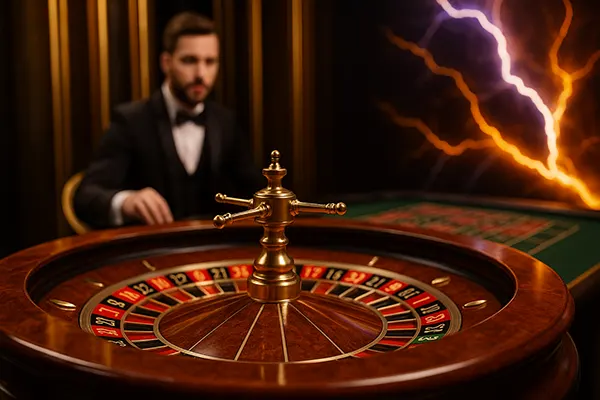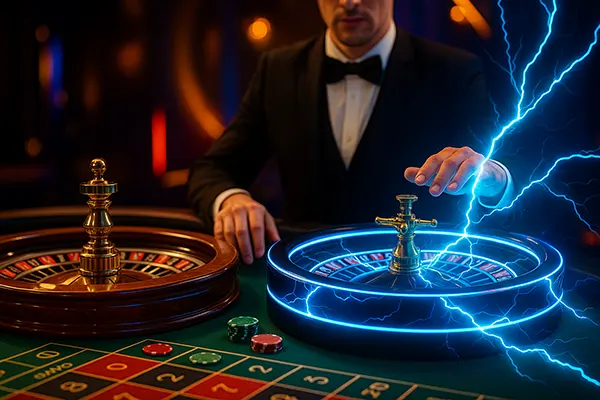The Evolution of Roulette: From Classic European to Innovative Lightning Roulette

Roulette has captivated players for centuries with its blend of luck, strategy, and anticipation. From candle-lit gaming halls in 18th-century France to today’s immersive live casino studios, the game has undergone a fascinating transformation. Each era has introduced fresh innovations while preserving the essence of spinning the wheel and watching where the ball will land. In 2025, one of the most striking examples of this evolution is Lightning Roulette, a dynamic reinvention of the classic European format.
The Origins of European Roulette
The roots of roulette trace back to 17th-century France, where mathematician Blaise Pascal’s experiments with a perpetual motion device inspired the creation of the first roulette wheel. The modern European version was formalised in the 18th century and quickly became a fixture in Monte Carlo’s luxury casinos. Its structure – a single zero wheel with 37 numbered pockets – offered players a more favourable house edge compared to the American variant with its double zero.
By the 19th century, European roulette spread across Europe, establishing itself as a game of sophistication and precision. Its simplicity and balance made it a symbol of fair play in gambling circles. The elegance of the wheel, combined with strategic betting options such as red/black, even/odd, and specific number wagers, created a timeless gaming experience that appealed to both high rollers and casual enthusiasts.
Today, European roulette remains one of the most widely played casino games worldwide. Its continued relevance lies in its straightforward rules, transparent odds, and the sense of control it offers to those who enjoy analysing probabilities. Despite digitalisation, the game’s core principles have remained virtually unchanged for over two centuries.
The Introduction of the American Wheel
When roulette crossed the Atlantic in the early 1800s, American casino owners modified the game to increase house advantage by adding an extra double zero pocket. This seemingly small change altered the mathematical balance, resulting in a higher house edge of 5.26%, compared to Europe’s 2.7%. The American wheel became the standard in Las Vegas and other gambling hubs across the United States.
The layout also evolved, featuring different table structures and betting sequences to suit regional preferences. While purists favoured the European version for its fairness, American roulette appealed to players seeking faster gameplay and higher risk. Both styles contributed to the global diversity of roulette formats that exist today.
In modern gaming venues, both wheels coexist, allowing players to choose between the strategic charm of European design and the fast-paced excitement of American roulette. This variety set the stage for future innovation and hybrid designs that would redefine the boundaries of traditional gameplay.
The Digital Revolution of Roulette
The late 20th century marked a turning point for roulette with the rise of digital gaming. Virtual roulette tables appeared on early online casino sites, allowing players to experience the thrill of the wheel from home. Developers soon began incorporating advanced random number generators (RNGs), ensuring fairness and replicating the randomness of physical spins.
As technology advanced, live dealer roulette became the next milestone. Streaming from professional studios, players could interact with real dealers and watch authentic wheels spin in real time. This format bridged the gap between online convenience and the social aspect of traditional gaming halls, restoring the human element that early virtual tables lacked.
By 2025, high-definition streaming, multi-camera setups, and real-time statistics have made live roulette nearly indistinguishable from a land-based experience. Innovations such as slow-motion replays, smart bets, and side statistics offer an enhanced, data-driven approach to a game once based purely on intuition.
Mobile Optimisation and Accessibility
One of the most transformative aspects of roulette’s evolution is its adaptation to mobile technology. Modern smartphones and tablets now support high-quality live streams, intuitive betting interfaces, and responsive layouts. This accessibility allows players to engage with roulette anytime, anywhere, without sacrificing the game’s immersive feel.
Leading software providers have optimised every feature for mobile performance, ensuring smooth transitions, gesture-based controls, and adaptive screen designs. As a result, the roulette wheel has become a global icon accessible at the tap of a finger, reaching millions of players worldwide.
Mobile integration has not only increased participation but also introduced innovative social elements, such as live chat and real-time leaderboards. These features make roulette more interactive than ever, transforming solitary play into a connected global experience.

Lightning Roulette: The Modern Reinvention
Launched by Evolution Gaming, Lightning Roulette has become a groundbreaking innovation in live casino entertainment. It retains the core mechanics of European roulette but introduces electrifying multipliers that can increase payouts on lucky numbers up to 500x. This modern twist combines traditional gameplay with elements of showmanship and unpredictability.
Every round, one to five numbers are randomly struck by lightning and assigned multipliers between 50x and 500x. Players who bet on these lucky numbers and win receive massively enhanced payouts. This system has redefined the excitement of roulette, offering both visual spectacle and elevated potential rewards while maintaining fairness and transparency.
In 2025, Lightning Roulette stands as a symbol of how innovation can revitalise a centuries-old game without losing its integrity. The fusion of advanced technology, entertainment value, and traditional mechanics ensures that roulette remains as relevant today as it was in Pascal’s era.
The Future of Roulette Gaming
Looking ahead, the evolution of roulette shows no signs of slowing down. Artificial intelligence, augmented reality, and blockchain integration are already shaping the next generation of gaming experiences. Future versions may include customisable wheels, immersive 3D environments, and fully decentralised betting systems.
Developers continue to prioritise responsible gaming and transparency, aligning with regulatory standards that protect players and ensure fairness. The integration of smart algorithms and real-time monitoring contributes to creating a safer and more engaging experience for global audiences.
Roulette’s enduring appeal lies in its ability to adapt while retaining its essence. Whether played on a physical table or streamed through an interactive interface, it remains a game that blends history, mathematics, and human excitement in perfect balance.
